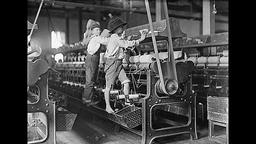
Industrial Revolution
Quiz by Ted Tiefel
Feel free to use or edit a copy
includes Teacher and Student dashboards
Measure skillsfrom any curriculum
Measure skills
from any curriculum
Tag the questions with any skills you have. Your dashboard will track each student's mastery of each skill.
With a free account, teachers can
- edit the questions
- save a copy for later
- start a class game
- automatically assign follow-up activities based on students’ scores
- assign as homework
- share a link with colleagues
- print as a bubble sheet
16 questions
Show answers
- Q1Parents accepted child labor because they needed the extra money.truefalseTrue or False30s
- Q2England was the first country to industrializetruefalseTrue or False30s
- Q3The Industrial Revolution moved production from the cottage industry to the factory.truefalseTrue or False30s
- Q4What natural resources gave Britain an advantage in the Industrial Revolution?Copper & CobaltNatural Gas and Geothermal SteamCoal and IronSteel & Brass30s
- Q5Prior to the Industrial Revolution, people livedOn farmsIn citiesIn suburbsTenements30s
- Q6With which of the following is Karl Marx most closely associated?trade unionismcommunismdemocracysocialism30s
- Q7Communisma political theory derived from Karl Marxan arrangement of machines, equipment, and workers in which work passes from operation to operation in direct line until the product is assembledThe rapid development of industry that occurred in Britain in the late 18th and 19th centuries, brought about by the introduction of machinery.an economic system in which investment in and ownership of the means of production, distribution, and exchange of wealth is made and maintained chiefly by private individuals or corporations30s
- Q8Industrial RevolutionAn arrangement of machines, equipment, and workers in which work passes from operation to operation in direct line until the product is assembledThe rapid development of industry that occurred in Britain in the late 18th and 19th centuries, brought about by the introduction of machinery.A political theory advocating class war and leading to a society in which all property is publicly owned and each person works and is paid according to their abilities and needs.An economic system in which investment in and ownership of the means of production, distribution, and exchange of wealth is made and maintained chiefly by private individuals or corporations30s
- Q9Assembly LineLiving in a cityAn arrangement of machines, equipment, and workers in which work passes from operation to operation in direct line until the product is assembledThe rapid development of industry that occurred in Britain in the late 18th and 19th centuries, brought about by the introduction of machinery.Characterized by farms, vegetation, and open spaces30s
- Q10CapitalismAn arrangement of machines, equipment, and workers in which work passes from operation to operation in direct line until the product is assembledAn economic system in which investment in and ownership of the means of production, distribution, and exchange of wealth is made and maintained chiefly by private individuals or corporationsCharacterized by farms, vegetation, and open spacesLiving in a city30s
- Q11RuralThe rapid development of industry that occurred in Britain in the late 18th and 19th centuries, brought about by the introduction of machinery.Characterized by farms, vegetation, and open spacesLiving in a cityAn arrangement of machines, equipment, and workers in which work passes from operation to operation in direct line until the product is assembled30s
- Q12UrbanCharacterized by farms, vegetation, and open spacesLiving in a cityAn arrangement of machines, equipment, and workers in which work passes from operation to operation in direct line until the product is assembledThe rapid development of industry that occurred in Britain in the late 18th and 19th centuries, brought about by the introduction of machinery.30s
- Q13What was the Industrial Revolution?increased populations of urban areas during the 1800sa widespread use of teenagers as factory laborers who worked 14-hour days, 6 days a weekincreased purchases of land by wealthy landowners to cultivate larger fieldsincreased output of machine-made goods that began in England during the 18th century30s
- Q14What was the main cause of the process of urbanization that occurred in the 19th century Britain and elsewhere in western Europe?industrializationimproved living conditions in citiesmore efficient transportation systemspoor crop yields30s
- Q15What is the most probable reason for the population growth in all cities between 1800 and 1850?agricultural revolutionIndustrial Revolutionnew middle classrailroads30s